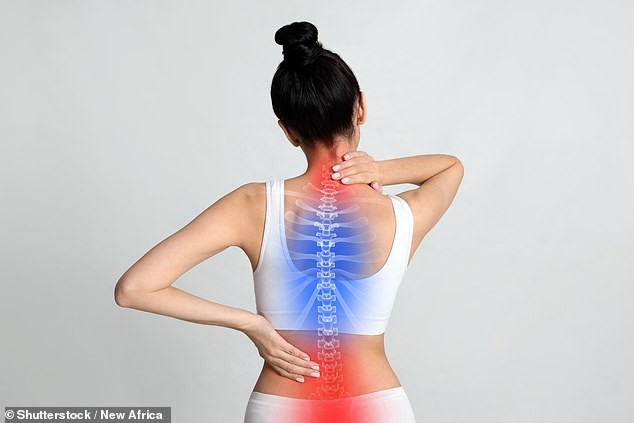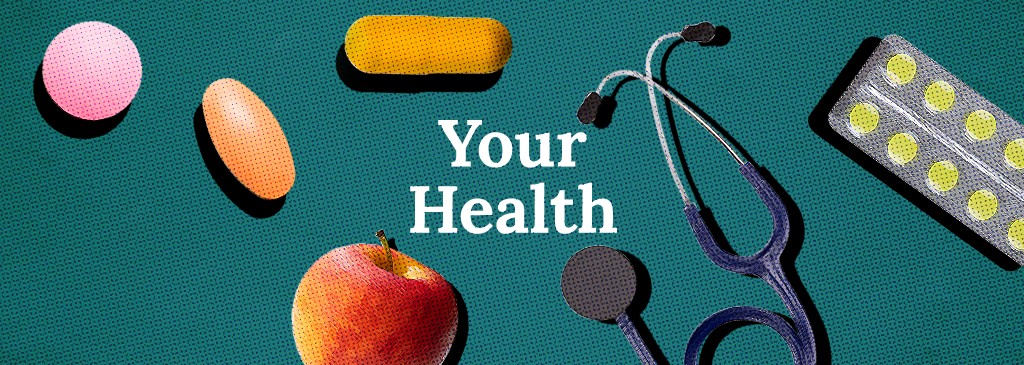Spinal surgeon reveals eight daily habits he swears by to stave off back pain — Prevention is the best cure
Globally, more than 600 million adults experience some form of back pain, making it the leading cause of disability, according to the World Health Organisation. NHS figures show 80 per cent of people in the UK will experience back pain at least once in their lifetime, and while most cases are not serious and will resolve within a few weeks, for others it can persist for months or even years. According to a survey by British Chiropractic Association, half of Britons suffer with back pain for a year or longer. Now a spinal surgeon has revealed daily habits he does throughout the day, to improve his back health. Dr David Baxter, a specialist in complex spinal surgery based in London, says prevention is the best defence. 'The majority of spinal conditions I treat are preventable. We shouldn't wait until our back hurts,' he told the Telegraph. 'A huge number of patients I operate on wouldn't need surgery if they intervened earlier.' He has mapped out a series of non-negotiables to protect his back, including getting a good nights sleep and a list of to-dos which he sticks to in the morning, at work and in the evening. Sign up for our free Health newsletter Transform your health every Tuesday with expert guides, real-life stories and advice from top doctors By signing up, you will receive our newsletter as well as marketing emails with news, offers and updates from the Daily Mail. You can unsubscribe at any time. For more information, see our Privacy Policy. A spinal surgeon has revealed habits he does every day to help stave off debilitating back pain

In This Article:
Get moving
Get moving For years, patients were told that bed rest was the best prevention and remedy for back pain, but this approach has long been debunked. It is also one of the biggest causes of back pain, explained Dr Baxter. He said: 'One of the most overlooked issues is a sedentary lifestyle. 'This is when conditions such as a disc prolapses and spinal stenosis can occur, unless we act.' A disc prolapse, also known as a slipped disc, is a painful condition where a soft cushion of tissue between the bones of the spine bulges outwards. Meanwhile a spinal stenosis causes pain when the nerves are squashed by a narrowing of the spinal bones.

Get a good night’s sleep
Get a good night’s sleep Dr Baxter starts his day at 5am after a 'good night's sleep', making sure he is in bed by 9.30pm the night before. 'Having spent 16 years constantly on call as a neurosurgeon, I really value waking refreshed,' he said. While there is little evidence getting up at 5am prevents back pain, a recent study found poor sleep does increase your risk of developing spinal twinges. It is thought this is because the body performs essential repair processes like muscle regeneration and tissue growth while we are asleep. Because back pain can keep people up at night, some people turn to sleep medications to get shut eye, but the surgeon doesn't recommend them. 'They knock you out but don't drop you into the deep, restorative sleep your body needs'. Instead, he recommends sticking to non-steroidal anti-inflammatories like ibuprofen and investing in a good mattress. 'There's no one-size-fits-all. I like a very hard mattress with no pillow (they give me neck pain), so my wife and I use a split-density mattress, which works well,' he said.

Drink water first thing
Drink water first thing The first thing he does after waking is 'drink a pint of water' because 'staying well-hydrated is essential for spinal health', he said. 'It keeps the discs flexible, helping protect against wear and tear. It also boosts your energy so you can stay active and recover well,' he explained. The discs, which act as shock-absorbing cushions in the spine, are made up of 80 per cent water, so dehydration causes them to shrink. Previously a study also found that dehydration can cause stiffness between the discs and other parts of the spine. Throughout the day the surgeon makes sure to stay hydrated, aiming to drink 'three-to-four litres' of water a day. This is double the NHS' daily fluid recommendation, which says that the average adult only needs to aim for 1.5 to two litres.

Regular stretching
Regular stretching Next, he does some light mobilisation exercises - gentle, controlled movements that are good for joint health - while listening to the radio. 'I work from head to toe, taking each joint through its gull range of motion - simple moves like neck rotations and extensions. 'I focus on my spine, and if my lower back feels tight, I'll stretch it out. 'A few minutes of daily mobility work is one of the best habits for keeping your body supple.' He recommends the cat-cow stretch, which involves getting on all fours with hands aligned under shoulders. The cat cow position is a type of yoga move which helps relieve tightness from the spine To do the yoga inspired stretch, breathe in as you drop your belly and lift your head to look upwards to get into the 'cow position'. Then exhale as you arch your back towards the ceiling and tuck your chin into your chest to move into the 'cat' position. Repeat this slowly several times to help relieve tension from your neck to lower spine, to prevent back pain. Equally he recommends knee rolls, crawling, glute bridges and side bridges to warm up and engages the back muscles.

Go for a walk
Go for a walk Four or five mornings a week Dr Baxter goes for a 'gentle walk or run'. He said: 'It's not a training session, just a leg-stretch to enjoy the fresh air and sunrise.' This habit, he explained 'works on many levels' as 'it gets you moving, lubricates your joints, and releases endorphins that reduce pain and lift your mood'. It can also help you get sunlight,which is vital for vitamin D production, which 'supports bone health'. In dark winter months he says a supplement can help. Supporting strong bone health helps strengthen the spine which can prevent painful injuries behind back pain.

Eat a healthy breakfast and fermented foods
Eat a healthy breakfast and fermented foods Then, he said: 'For breakfast, I'll usually have berries with mixed nuts and a couple of spoonfuls of kefir sprinkled with cacao. 'Gut health is incredibly important for wellbeing, spinal health and preventing inflammation. 'The gut and spine communicate directly, and your gut flora determines how you process food and medication.' Your gut flora is a community of trillions of bacteria, viruses and fungi in your digestive track that help break down food. The surgeon has kefir a type of fermented milk that's good for gut health for his breakfast His own research has found a 'clear link' between gut health, spinal-cord injury progression, osteoporosis - weak bones - and pain caused by nerve damage. Previous studies have shown probiotics, 'good bacteria' which can come as supplements, improve gut health. But Dr Baxter doesn't personally take them, because he doesn't believe that probiotic supplements make much difference. Instead, he hails 'fermented foods such as live yoghurt [a fermented milk] or kimchi, with plenty of fruit and vegetables'.

Stay active and standing desk
Stay active (and get a standing desk) It's important to keep moving throughout the day, Dr Baxter said, so he cycles to work when he can. 'As a hospital doctor, I'm on my feet a lot - my Garmin [a fitness tracker] shows I cover around seven miles a day. I make a conscious effort to move more,' he said. 'I walk over to see colleagues instead of calling and get up every 20 to 30 minutes when at my desk. It's good for mental health and relationships.' Meanwhile, at home, he said: 'I use a standing desk which is generally good for your posture and can ease back pain, depending on your condition.' He warned that 'too much sitting is directly linked to spinal problems' which he is seeing more of in his line of work. This includes neck and musculoskeletal issues which he said can manifest as 'that hunched "tech-neck" posture which strains your spine.' Previously a woman, Trudi Yip, shared how she suffered 'tech neck' from sitting at a desk (left) and reversed it (right) To avoid prevent this keeps his computer screens at eye level and cuts down on screentime where possible. Dr Baxter also does weight training five days a week, as well as three running sessions - two short and fast sessions, plus a longer slower run on Sundays. 'Think you don't have to do ultra-marathons, but everyone should do resistance training. It builds stability, protects the spine and improves posture, when done correctly,' he said. 'If you have back pain, or conditions like arthritis and osteoporosis, just adapt what you do. Movement is medicine - even a little helps. 'If you can't swim, walk up and down the pool - it's great for building muscle. Thai chi and palates are also excellent for controlled movement and core activation. But he added: 'Overdoing it can strain the musculoskeletal system and compromise recovery. I'm seeing younger women with back problems from heavy lifting.'

Find ways to relax
Find ways to relax It's also important to find ways to manage stress which he does by going to a 'sauna and cold plunge' after work a few times a week. 'They're wonderful way to reset. I also book a monthly massage. Manual therapies can provide short-term relief for back pain and stiffness.' A previous study found sitting in a dry sauna can help alleviate lower back pain, but there is limited evidence that heat therapy it can prevent it from developing. However, it can lower stress, which has been linked to a higher risk of developing lower back pain. Similarly, studies have shown that massages done professionally can help treat lower back pain.

Take a cold shower before bed
Take a cold shower before bed Dr Baxter rounds off his day with an icy shower. He said: 'Twenty minutes before bed I take a cold shower to lower my body temperature, which helps me fall asleep.' This is a habit many experts have recommended doing in the morning to help you stay alert. Previously a study showed that slightly turning the thermostat down can help trigger longer, deeper sleep. But generally experts say people have a warm shower in the evening to fall asleep more easily. This is because the warmth helps release the hormone melatonin - which tells the body it's time to sleep.


